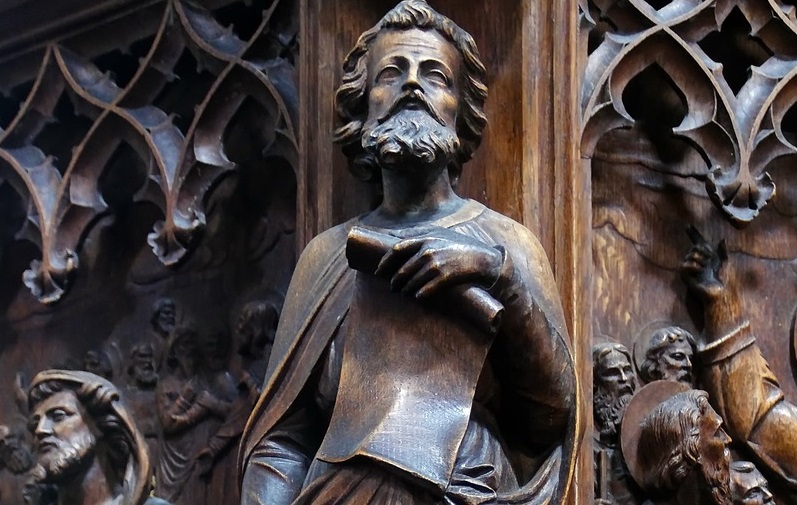Click here to listen to this homily.
It was the prophet Jeremiah that was doomed to preach the doom of the kingdom of Judah, a calling to which he was faithful all his bitter life. Preaching to a people too proud of their heritage, too presumptuous and assured of the blessing of God upon them, they were stubborn, and he cursed the day he was born, faithful prophet though he was.
As he preached, the enemy was near: Babylonians at the gates threatened to end God’s little kingdom of Judah, corrupt and proud. Zedekiah, king at the time, and as politicians sometimes do, found religion in the crisis. He called upon his people to renew their commitment to the whole law of God, all those little things, which in their greed, they didn’t think important—fair care of the poor, spiritual purity. The king called for the emancipation of the indebted. Maybe this will turn the tables, he thought. Maybe this will change God’s mind. Maybe this will save us.[1]
But it was too little, too late, and half-hearted at that. They had not lived the ethics of the covenant. They had not cared for the widow or the orphan, the stranger or the poor. They didn’t care; they didn’t do, and so God did. And it was Jeremiah’s bitter prophecy which came to pass: “You did not obey me,” God said though him, and so “I will make you an object of horror to all the kingdoms of the earth…the cities of Judah I will turn into a desert where no man dwells.”[2] All because they didn’t live the ethics of the covenant of the God they professed to worship, the God in whom they were mistakenly proud.
Such is the tragedy of Jeremiah, which too few read today. And it is the other side of the story begun in Exodus, which we have just heard. Moses on Sinai proclaimed the ethics of the covenant, the agreement between God and Israel. They were to be a people that did not oppress the alien, for they too were once aliens in Egypt. They were to care for widow and orphan, because God loved them especially. They were to be people who were honest and equitable, people with hearts, like God’s, of compassion, not extortion. “You shall not revile God,” Moses said, and that’s what it meant—honoring God by living out the ethics of the covenant, in every detail.[3]
This was the dream of God, of a peaceful people in harmony and solidarity, not only spiritually but also materially, truly and ethically bound together in compassion. “[T]here should be no one of you in need,” it says in Deuteronomy; that was the dream, of a people in real communion, a communion more than mere words and religious rituals, a communion of people who loved one another.[4] The dream was of community of believers that wouldn’t dare worship God while standing next to people they weren’t willing to help. And, of course, this is the biblical dream of the Church—a “community of believers,” as Luke said, “of one heart and mind.”[5]
But why all this biblical history, which is more, really, than your average Roman Catholic can handle? Why tell you about the tragedy of Jeremiah, the promise and the threat of the covenant, and the dreams of Moses and God and the New Testament?
Because I want to show you the depth and the seriousness of the moral commandments of Jesus Christ, the command to love God and your neighbor as yourself. Because I want to offer you something deeper than cheap sentimental poetry about love, the moral righteousness of those threatening words of that poet John Donne, his truth that, “We can die by it, if not live by love…”[6]
“You shall love the Lord, your God…You shall love your neighbor as yourself.”[7] Now you know what this gospel means, even if you’re too angry to admit it, too embittered or worn down. You know what it means to love your neighbor as yourself: that it means loving the immigrant, documented or undocumented; that it means loving the atheist, the homosexual, the Republican, the Democrat, white folk, black folk, brown folk, even the racist and the know-it-all, your in-laws, coworkers, Muslims, Protestants, the person at the end of the pew, the unborn—”for God so loved the world.”[8] You know what this gospel means.
It’s just that you need to know that this gospel is meant for you, and at the very point where you disagree with it. You need to know that you can’t wriggle out of it, that you can’t make excuses. It’s what Jeremiah said to his people: if you say, “I am innocent…Behold, I will judge you on that word of yours.”[9] Be careful when you talk about love; do you really mean it? Love of God and of neighbor are absolute commandments, and they’re meant for us. And we don’t get to decide who our neighbors are, God does. Love thy neighbor is meant precisely for those persons you don’t want to love, precisely for that person you have difficulty with. “[F]or God so loved the world”—a nasty, wicked world that didn’t deserve love but was loved by God anyway. That’s why we must love our neighbors, even the unlovable ones, because God loved us when we were unlovable. And we didn’t deserve it either.
Now for those of you on the right who think I’m letting the side down, slipping in my orthodoxy; and those of you on the left who think I’m affirming your sophisticated and culturally celebrated disagreements with the teachings of the Church: you are both wrong. Rather, what I am simply saying is that each of us—no matter what we think about anything—would do well to be obedient to Jesus’ commands to love. We would do well to break our heart on this altar of love, and quit giving God such little time and such little attention. We would do well to give ourselves in love to each other, even outcasts, even enemies, and quit thinking we know better than Jesus whose words on this subject were crystal clear. What I am saying, again simply, is that we would do well to love—in this world of hate—that our life depends on it.
But how do we begin? How, in this divided world, can we even begin to love the way Jesus commands us to love? It’s actually very simple. It’s not hard at all. Actually, it’s something each of us can do today, and with very little effort.
Simone Weil said once, “The love of neighbor in all its fullness simply means being able to say…: ‘What are you going through?’”[10] What are you going through? That is what it means to love your neighbor; it’s the first question we should ask. What are you going through?
Brothers and sisters, I think that’s the truth. I think that’s the loving question we should ask before anything else. With the person so very different than you, the person who thinks differently than you: before you opine or argue or analyze, ask, “What are you going through?” And be interested in their answer! In this world, divided so deeply about so much in which so many of us have been made enemies of each other, perhaps this is the question that will help us begin to heal: What are you going though? This is something each of us can do, a question each of us can ask, and with very little effort. And it’s the question I think we should ask, if we are to love our neighbor and our God as we ought. Amen.
[1] Jeremiah 34:8-11
[2] Jeremiah 34:17, 22
[3] Exodus 22:20-27
[4] Deuteronomy 15:4
[5][5] Acts 4:32
[6] John Donne, “The Canonization” (1633)
[7] Matthew 22:37-38
[8] John 3:16
[9] Jeremiah 2:35
[10] Simone Weil, Waiting for God, 115
© 2020 Rev. Joshua J. Whitfield










